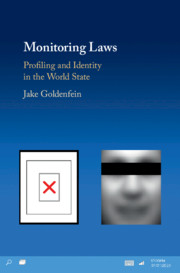Book contents
- Monitoring Laws
- Monitoring Laws
- Copyright page
- Contents
- Acknowledgements
- 1 Monitoring Laws
- 2 The Image and Institutional Identity
- 3 Images and Biometrics – Privacy and Stigmatisation
- 4 Dossiers, Behavioural Data, and Secret Speculation
- 5 Data Subject Rights and the Importance of Access
- 6 Automation, Actuarial Identity, and Law Enforcement Informatics
- 7 Algorithmic Accountability and the Statistical Legal Subject
- 8 From Photographic Image to Computer Vision
- 9 Person, Place, and Contest in the World State
- 10 Law and Legal Automation in the World State
- Index
5 - Data Subject Rights and the Importance of Access
Published online by Cambridge University Press: 08 November 2019
- Monitoring Laws
- Monitoring Laws
- Copyright page
- Contents
- Acknowledgements
- 1 Monitoring Laws
- 2 The Image and Institutional Identity
- 3 Images and Biometrics – Privacy and Stigmatisation
- 4 Dossiers, Behavioural Data, and Secret Speculation
- 5 Data Subject Rights and the Importance of Access
- 6 Automation, Actuarial Identity, and Law Enforcement Informatics
- 7 Algorithmic Accountability and the Statistical Legal Subject
- 8 From Photographic Image to Computer Vision
- 9 Person, Place, and Contest in the World State
- 10 Law and Legal Automation in the World State
- Index
Summary
Access has become a keyword of the twenty-first century. However, even in the 1960s, government data collection and growing computational power facilitated new forms of statistical analysis that people thought could become new ‘intelligence’ systems. The legislative response to these threats were new data protection and information privacy regimes that included ‘data subject rights’ – mechanisms by which individuals could obtain access to information about them held by others, and rectify any inaccuracy. This type of transparency gave individuals a way to participate in the profiling regime, by attempting to ensure that the data used by profilers was accurate and relevant. Informed by the German constitutional concept of informational self-determination, limitations to profiling in data protection are premised on the idea that a person’s self-image ought to be the primary determinant of their identity. However, it is argued here that this approach loses traction as the profiling environment becomes more sophisticated.
Keywords
- Type
- Chapter
- Information
- Monitoring LawsProfiling and Identity in the World State, pp. 78 - 98Publisher: Cambridge University PressPrint publication year: 2019

